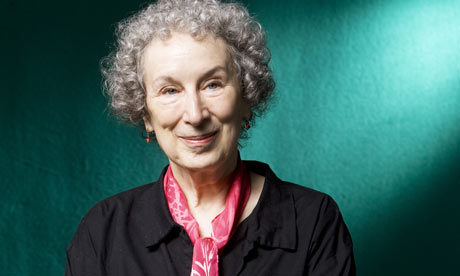4月27日星期二晚,面对来自世界各地的著名作家,加拿大作家玛格丽特·阿特伍德(Margaret Atwood)接受了美国笔会颁发给她的文学服务奖(American PEN Literary Service Award)。 在这次颁奖会上,阿特伍德发表了精彩的获奖演说。在演说中,阿特伍德女士畅谈了要保证作家免遭审查制度干扰的重要性,以及小说推动人前进的力量。下面就是阿特伍德女士的演讲文稿(我对某些语句加粗以示强调),与大家分享。【PS: 在此要感谢新浪微博上 @上海译文 和 @白不说,通过他们,我才获得了这一信息,才可以顺藤摸瓜,找到了原文。】
Why We Must Defend Writers
Margaret Atwood
Dear American PEN—and many survivors of battles over the years—thank you very much. We started PEN Canada with $20 and a roll of stamps. It got bigger. So did yours.
I thank you very much for this award. I am joining a list of very distinguished writers, and I probably don’t deserve to be joining it; but as the theologically pessimistic used to remark, if we all got what we deserved, we’d be boiling in oil.
I hope however that this recognition is not the equivalent of the gold watch to the retiring manager. No, surely not! For writers can’t retire, nor can they be fired: As we hear constantly from those who think there should be no arts grants, writers don’t have real jobs. That’s true, in a way: They have no employers. Or rather their employers are their readers: which imposes on them a truly Kafkaesque burden of responsibility and even guilt, for how can you tell whether you’re coming up to the standards of people you don’t even know? Publishing a book is like stuffing a note into a bottle and hurling it into the sea. Some bottles drown, some come safe to land, where the notes are read and then possibly cherished, or else misinterpreted, or else understood all too well by those who hate the message. You never know who your readers might be.
Or else you find out in an unpleasant way: You’re arrested, you are condemned, you are tortured, you are shot, you disappear. Those doing the shooting and the torturing, whether they are from the left or the right, whether they represent theocracies or secular totalitarian dictatorships or extreme factions, all have one thing in common: They wish to silence the human voice, or all human voices that do not sing their songs. They wish to indulge their sense of power, which is best done by grinding underfoot those who cannot retaliate. Writers—artists in general—are easy prey for the silencers. They don’t have armies. They can be cut out from the herd—they‘ve already cut themselves out, by daring to speak—and few in their own countries will be foolhardy enough to defend them.
Voices can be silenced, but the human voice cannot. Our languages are what make us fully human—no other creature has anything like our rich and complex vocabularies and grammars. Each language is unique: To lose one is to lose a range of feeling and a way of looking at life that, like a living species that becomes extinct, can never be replaced. Human narrative skills are found in every language, and are very old: We all have them. We writers merely use them in what we fondly believe are more complex ways. But whether written down or not, stories move—from hand to paper to eye to mouth, from mouth to ear.
And stories move us. This is their power. Written stories are frozen voices that come to life when we read them. No other art form involves us in the same way—allows us to be with another human being—to feel joy when he laughs, to share her sorrow, to follow the twists and turns of his plotting and scheming, to realize her insufficiencies and failures and absurdities, to grasp the tools of her resistance—from within the mind itself. Such experience—such knowledge from within—makes us feel that we are not alone in our flawed humanity.
None of us are so mad as to suppose that all books are really good things. Mein Kampf was a book. So we are constantly enmeshed in a choice-of-evils struggle: Which is worse, to allow free access, or to start censoring? And once the censoring begins, who shall be in control of it, and where will it stop? Nor is such blue-penciling a habit of ruthless dictators only.
I suppose we at PEN have an optimistic view of human nature: that, given full access to everything on the menu, people on the whole will reject the tyrannical, the sadistic, and the repugnant. Also optimistic is our conviction that if we battle on behalf of the ever-swelling number of novelists, journalists, poets, and playwrights who have been condemned for their writing, at least some of the battles will be won. As many of them have been.
Though some have not. Each time one of these battles is lost, the muffling silence creeps closer. And it’s in silence and in secrecy that the worst horrors breed.
Yet sooner or later—we trust—even these hidden stories will be told. The messengers in such cases are seldom welcome; yet they are necessary, and must be protected. For if we cannot acknowledge that the shadows exist—the shadows cast by others, as well as the ones we cast ourselves—how can we hope to dispel them?

 1. 凯伊·瑞安(Kay Ryan)的诗歌多短小精悍,一首诗可以作为一条推发表。然而她的诗歌的短小凝炼却没有给人留下轻松时髦的印象。她的语调包含着古怪和鲁莽,有趣却令人不爽,有着明显的失败和失落留下的沧桑。她的大智若愚会自然而然地抓住你阅读的神经。瑞安女士的最新诗歌集《最好:新诗选集》(The Best of It: New and Selected Poems)是迄今为止诗人诗歌创作的集大成者。瑞安女士出生于1945年。她的父亲是加利福尼亚的一位石油钻井工。在去洛杉矶的加州大学之前,她读的是社区学院。在那里她出版了自己的第一部诗集《龙行龙尾》(Dragon Acts to Dragon Ends, 1983)。瑞安女士目前是第16位美国桂冠诗人。瑞安女士对美国诗歌界各种俗务应酬嗤之以鼻。她在加州马林县的一所社区学院里教授英语补习课程30多年。她的最新诗歌集的标题其实并无自我吹嘘之嫌。《最好》其实是她创作于2005年的一首题为“尼亚加拉河”(“The Niagara River”)的诗歌中提到的一艘驱逐舰的名字。那首小诗是这样的:
1. 凯伊·瑞安(Kay Ryan)的诗歌多短小精悍,一首诗可以作为一条推发表。然而她的诗歌的短小凝炼却没有给人留下轻松时髦的印象。她的语调包含着古怪和鲁莽,有趣却令人不爽,有着明显的失败和失落留下的沧桑。她的大智若愚会自然而然地抓住你阅读的神经。瑞安女士的最新诗歌集《最好:新诗选集》(The Best of It: New and Selected Poems)是迄今为止诗人诗歌创作的集大成者。瑞安女士出生于1945年。她的父亲是加利福尼亚的一位石油钻井工。在去洛杉矶的加州大学之前,她读的是社区学院。在那里她出版了自己的第一部诗集《龙行龙尾》(Dragon Acts to Dragon Ends, 1983)。瑞安女士目前是第16位美国桂冠诗人。瑞安女士对美国诗歌界各种俗务应酬嗤之以鼻。她在加州马林县的一所社区学院里教授英语补习课程30多年。她的最新诗歌集的标题其实并无自我吹嘘之嫌。《最好》其实是她创作于2005年的一首题为“尼亚加拉河”(“The Niagara River”)的诗歌中提到的一艘驱逐舰的名字。那首小诗是这样的:

 5. 查尔斯·马斯卡廷(Charles Muscatine),是一位乔叟(Chaucer)研究专家。他通过人们对乔叟诗歌模型的关注转移到了法国诗歌传统方面来,从而改变了乔叟研究的面貌。此外,马斯卡廷还是一位积极的教育改革家。他在加州大学伯克利分校执教期间,长期支持自由言论运动。今年3月12日,马斯卡廷先生在加州的奥克兰逝世,享年89岁。马斯卡廷先生的《乔叟和法国传统:风格及意义研究》(Chaucer and the French Tradition: A Study in Style and Meaning)由加州大学出版社于1957年出版。迄今为止,这部书仍然不失为乔叟研究的巅峰之作。
5. 查尔斯·马斯卡廷(Charles Muscatine),是一位乔叟(Chaucer)研究专家。他通过人们对乔叟诗歌模型的关注转移到了法国诗歌传统方面来,从而改变了乔叟研究的面貌。此外,马斯卡廷还是一位积极的教育改革家。他在加州大学伯克利分校执教期间,长期支持自由言论运动。今年3月12日,马斯卡廷先生在加州的奥克兰逝世,享年89岁。马斯卡廷先生的《乔叟和法国传统:风格及意义研究》(Chaucer and the French Tradition: A Study in Style and Meaning)由加州大学出版社于1957年出版。迄今为止,这部书仍然不失为乔叟研究的巅峰之作。 6. 国际笔友会/福克纳基金奖(the PEN/Faulkner Award)评委会于3月23日宣布,舍尔曼·阿列克塞(Sherman Alexie)获得了今年的笔友会/福克纳基金奖小说奖。他的获奖作品是一部短篇小说和诗歌集《战争之舞》(War Dances)。与阿列克塞同时参与角逐的还有巴巴拉·金索尔福(Barbara Kingsolver)、洛兰·M·洛佩兹(Lorraine M. López)、罗利·莫尔(Lorrie Moore)和科尔森·怀特黑德( Colson Whitehead)。阿列克塞曾与2007年获得过国家图书奖( the National Book Award)的青少年文学奖。这次,阿列克塞先生将捧走总额15,000美金的奖金。
6. 国际笔友会/福克纳基金奖(the PEN/Faulkner Award)评委会于3月23日宣布,舍尔曼·阿列克塞(Sherman Alexie)获得了今年的笔友会/福克纳基金奖小说奖。他的获奖作品是一部短篇小说和诗歌集《战争之舞》(War Dances)。与阿列克塞同时参与角逐的还有巴巴拉·金索尔福(Barbara Kingsolver)、洛兰·M·洛佩兹(Lorraine M. López)、罗利·莫尔(Lorrie Moore)和科尔森·怀特黑德( Colson Whitehead)。阿列克塞曾与2007年获得过国家图书奖( the National Book Award)的青少年文学奖。这次,阿列克塞先生将捧走总额15,000美金的奖金。